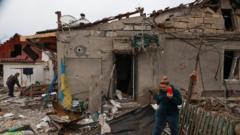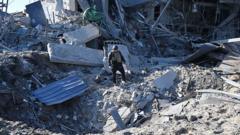Efrat Machikawa expresses disbelief at her uncle Gadi Moses's survival after being held hostage by Hamas for 15 months, highlighting the extreme conditions he endured. While celebrating reunions, families grapple with the trauma of captivity as other hostages await their fate in the ongoing conflict.
Survival and Reunion: A Tale of Hostage Resilience Amidst War's Turmoil

Survival and Reunion: A Tale of Hostage Resilience Amidst War's Turmoil
As hostages return from captivity, harrowing details of their survival emerge, revealing the emotional toll on families and the resilience of those affected by conflict.
In a heart-wrenching story of survival and hope, 80-year-old Gadi Moses, recently released from 15 months of captivity by Hamas, left both his family and a global audience grappling with the severe conditions he faced. His niece, Efrat Machikawa, recounted that her uncle survived on minimal rations—a piece of bread and an olive twice daily. "I have no idea how he survived," she stated, emphasizing his harrowing loss of weight and minimal hygiene. Moses was provided only a small bowl of water every five days, and loneliness marked much of his experience, described by Machikawa as "another form of torture."
Despite these dire circumstances, Moses remained mentally active, calculating math problems, walking up to six miles a day within the confines of a room, and drawing strength from the hope of reuniting with his family. Machikawa noted that his mental resilience became a form of sustenance for his spirit during his confinement.
As part of a ceasefire agreement between Israel and Hamas that has resulted in the release of several hostages, Moses’s return is a mix of relief and reflection. The ceasefire, in effect since January 19, aims to resolve a conflict that has lasted over 15 months and resulted in significant casualties, with over 47,000 reportedly killed in Gaza. Yet, the anguish of families remains palpable, as many still await news of loved ones.
Another American-Israeli hostage, 65-year-old Keith Siegel, also returned to his family, who noted his significant weight loss and the emotional scars of captivity. His niece, Tal Wax, described the relief of having him back while expressing concern for the toll his experience had taken. "Although we see that he is able to walk and talk, we see that he has lost a lot of weight," she explained.
Machikawa conveyed mixed emotions about her uncle’s release, fearing for the remaining hostages and underscoring a collective yearning for peace. "We must eradicate terror," she urged, while highlighting the necessity for Israel to strengthen its security and strive for a better future.
While some hostages have begun to share their stories of survival, the humanitarian impact of the conflict runs deep, as other families, like the Bibas family, find themselves welcoming back only a fraction of their loved ones. The Bibas family declared, "A quarter of our heart has returned to us," underscoring the ongoing despair they endure.
As discussions of rehabilitation and healing emerge, there is an acknowledged understanding among survivors and their families that the journey ahead is fraught with challenges. "It will take time and it's a process," former hostage Doron Steinbrecher shared in a video statement, showing solidarity with those still suffering from captivity.
The releases continue, with hopes centered on the remaining hostages and the urgent need for resolution in this prolonged conflict, reminding the world of both the fragility of life amidst violence and the enduring strength of family bonds in the face of adversity.
Despite these dire circumstances, Moses remained mentally active, calculating math problems, walking up to six miles a day within the confines of a room, and drawing strength from the hope of reuniting with his family. Machikawa noted that his mental resilience became a form of sustenance for his spirit during his confinement.
As part of a ceasefire agreement between Israel and Hamas that has resulted in the release of several hostages, Moses’s return is a mix of relief and reflection. The ceasefire, in effect since January 19, aims to resolve a conflict that has lasted over 15 months and resulted in significant casualties, with over 47,000 reportedly killed in Gaza. Yet, the anguish of families remains palpable, as many still await news of loved ones.
Another American-Israeli hostage, 65-year-old Keith Siegel, also returned to his family, who noted his significant weight loss and the emotional scars of captivity. His niece, Tal Wax, described the relief of having him back while expressing concern for the toll his experience had taken. "Although we see that he is able to walk and talk, we see that he has lost a lot of weight," she explained.
Machikawa conveyed mixed emotions about her uncle’s release, fearing for the remaining hostages and underscoring a collective yearning for peace. "We must eradicate terror," she urged, while highlighting the necessity for Israel to strengthen its security and strive for a better future.
While some hostages have begun to share their stories of survival, the humanitarian impact of the conflict runs deep, as other families, like the Bibas family, find themselves welcoming back only a fraction of their loved ones. The Bibas family declared, "A quarter of our heart has returned to us," underscoring the ongoing despair they endure.
As discussions of rehabilitation and healing emerge, there is an acknowledged understanding among survivors and their families that the journey ahead is fraught with challenges. "It will take time and it's a process," former hostage Doron Steinbrecher shared in a video statement, showing solidarity with those still suffering from captivity.
The releases continue, with hopes centered on the remaining hostages and the urgent need for resolution in this prolonged conflict, reminding the world of both the fragility of life amidst violence and the enduring strength of family bonds in the face of adversity.





















